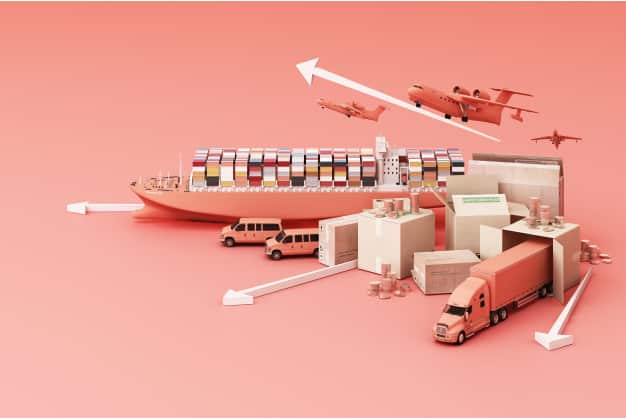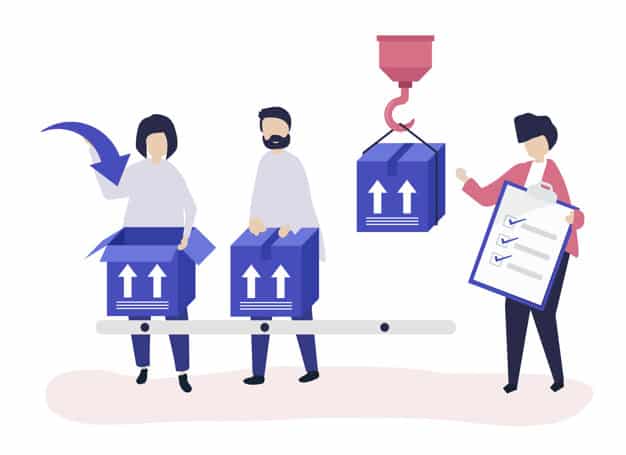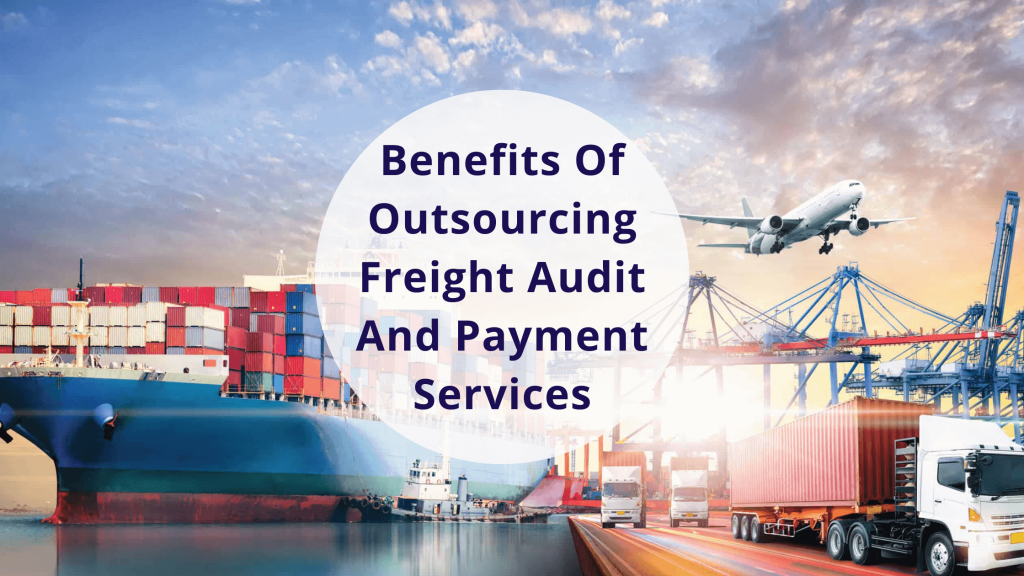Freight billing is complicated, and there are so many moving parts that leaks in revenue can go unnoticed. Only 17% of freight invoices are accurate. Whether they are just small errors or more serious ones, they will add up. Freight bill auditing is not just about catching mistakes, but the information obtained from freight auditing and payments must lead to significant improvements in the freight billing process.
There are no two ways about it – freight invoice auditing is one of the most significant contributors to reducing freight spending for logistics and supply chain companies. If overbilling and duplicate payment occurrences are reduced, shippers can save 2-8% on freight spending. It pays to audit freight invoices but is it better to do it internally or outsource it? Let’s dive into why freight audit and payments are considered a complicated process before we get to that.
Why is freight audit so complicated?
Transportation charges are the most volatile part of freight bills. Transportation charges can rise and fall as the fluctuations in fuel prices directly control them. Freight charges are never straight forward, and two companies shipping a similar item to the same destination might not pay the same amount. Companies can be overcharged if they do not have a firm grasp of the complex freight pricing system.
To prevent overpaying, two levels of freight bill auditing is a necessity. Freight bills should always be pre-audited before making a payment. Even if using logistics software, it is still possible to make errors in the shipping invoice. Compliance with contractual obligations, applying taxes, and ensuring there are no overcharges. Many companies might stop at pre-audit because they might not have the resources to carry out a post-audit.
It is always advised to couple a pre-audit with a post-audit. A post-audit is carried out on a batch of invoices every few months. It gives a bigger picture of whether your account may have been overcharged. Post-audits must be scheduled, keeping in mind the statute of limitations for different carriers. For example, motor freight might have a limit of 180 days (from the date of delivery) beyond which you cannot claim compensation.
Shipping Invoices can Contain Errors
Generally, businesses want the shipment’s details to match the written BOL (bill-of-lading).
However, there are specific circumstances in which they are subject to changes and additional fees. Reviewing bills against facts supplied on the BOL is a prime area to look for overcharges as an estimate of 5-6 percent of all carrier bills get calculated inaccurately.
There are dozens of errors shipping invoices can contain. We want to focus only on the 5 top errors. It must be:
- Incorrect Carrier Name and Number
- Incorrect Contact Information
- Incorrect Discount Rates
- Wrong Calculations of Weight, Dimensions, Pallet Count, and NMFC
- Accessorial Requests and Fees
1. Incorrect Carrier Name and Number
The carrier name and number should be one of the first things a shipper checks on their invoice, especially given the ease of passing a shipment onto the wrong truck when freight is offered and tendered to a carrier. Unfortunately, this happens far more frequently than one might expect, especially if the warehouse has a busy dock and several trucks are moving in and out for pick-ups across the day.
While picking up a shipment by the wrong carrier may not delay delivery, it may result in an overcharge. If a consumer has negotiated pricing with a specific carrier but did not pick up their load, they will likely receive a greater cost than planned.
2. Incorrect Contact Information
Incorrect contact information is another common invoicing error. This issue could indicate that the address for pick-up or delivery is faulty or that the invoice’s “bill-to” section is erroneous.
Incorrect addresses will almost always result in a delivery delay, but they can also result in additional fines. Many freight companies will bill clients if a carrier arrives at a delivery location and the shipment gets denied for address inaccuracies. Moreover, if delivery to the actual site necessitates an appointment, there will be an extra charge.
3. Incorrect Discount Rates
As previously stated, several shippers negotiate customized prices with either a 3PL or a carrier directly. This error can involve a percentage reduction, reduced or waived accessorial fees, or pre-arranged FAK agreements.
It is critical to have any agreements with a carrier on file and audit invoices to ensure that those rates get accurately reflected and represented in the charges. Check each line for fuel surcharges, mileage, and other considerations, as the savings may not be on the total cost.
Furthermore, when working with a 3PL, the billing party, either shipper or receiver, must ensure the correct “bill-to” gets used on the BOL. It may come out as unfortunate when discounts go unreported, and the client is invoiced directly from the carrier without the proper reductions listed.
4. Wrong Calculations of Weight, Dimensions, Pallet Count, and NMFC
The majority of shippers have faced obtaining a freight bill that was rife with unjustified charges due to incorrect item details. Furthermore, it is the most common cause for a freight invoice getting challenged, and it’s an understatement to suggest that changes to weight, freight class, dimensions, and other factors can significantly impact a shipment’s total cost.
5. Accessorial Requests and Fees
Accessorial expenses are incurred for additional services specified by the shipper or receiver but might inadvertently appear on a freight invoice. Accessorial fees can be scheduled and requested on the BOL, or they can emerge out of necessity during pick-up or delivery and get billed after that, including lift-gate, interior delivery, and driver assistance.
Effective communication between the shipper and receiver is the best method to avoid freight invoice problems. Learn about the sort of particular destination, whether a dock and delivery team are available, and what kind of truck will be required to make a delivery. Ultimately, it is up to the shipper and receiver to determine which services are fee-based and whether they can prevent the need for these extra services in the first place.
Challenges with Auditing Freight Invoices Internally
Auditing is rarely an exciting task for anyone in the transport and logistics industry, but someone has to do it.
While the business case is well established for the benefits of freight bill audits, most shippers find it too costly to develop an in-house freight bill and payment system. They specialize in what they do, and this expertise rarely extends to auditing freight and parcel invoices.
Training an in-house team can be prohibitive. Outsourcing is a more economical way to maintain sound financials. Partnering with a freight bill and payment company (FBAP) specializing in such audits makes more sense since the service fees are much less than the generated savings.
Freight bill audits can recover almost 8% of total freight spend. Across 10,000 products shipped, that is a saving of up to $1 Million.
The greater market demand, especially with the boom in e-commerce, workloads have increased, and the added strain on internal resources is a factor for companies considering outsourcing. So, while an internal audit team might sound good, the shortage of talent and the high cost of mistakes put pressure on already overloaded internal systems.
Whether your internal audit recovers overpaid freight charges or not, you still have to pay your team to audit each one of the invoices, and that is a mountain of paperwork.
An outsourced provider charges a percentage of payments recovered. That’s one of the most significant differences. – an in-house team has a fixed labor cost irrespective of the outcomes. On the other hand, with an outsourced team, the shipping company is not paying for invoices that have been correctly billed. An independent freight auditing and payment company will bill you only if it finds billing discrepancies resulting in chargebacks. This is usually a percentage of the chargeback recovered.
Studies show that internal freight bill audits are on average ten times more costly than using an independent service.
A freight bill auditor has an extensive checklist to detect overcharging errors. It is a time-consuming process and a benchmark for quality that few internal teams can match.
A few of these checklist steps are
• Did the discounts on the invoice match agreements with your carrier’s
• Duplicate invoices? This is one of the most common errors
• Check against promised delivery dates. If your carrier did a late delivery, you don’t pay.
• Were the accessorial charges incorrect for service provided outside of the standard shipping agreement?
• Did the invoices bill the correct mileage?
• Were the correct taxes added based on geography?
If there is any discrepancy, the recovery process kicks in. A claim will be filed with the carrier on your company’s behalf, and when a payment is made, you receive the check.
A cautionary note needs to be added here – not all companies audit the bills in the same way. Ensure that the process they follow is a good fit for your company.
If your company prefers to keep control through internal teams, you need to evaluate and invest in freight auditing software. Without the technology and expertise internally, freight bill auditing will not provide any significant chargebacks. Freight Audit software is expensive, and maintaining it adds additional cost. Large companies have the capital to do this, but smaller and mid-size companies will find it more cost-effective to leave it to an independent freight audit and payment provider.
Whether you decide on using an in-house audit team or third-party specialists, there is no getting away from the bottom line – you can make more money if you audit your freight bills.
If you are deciding to outsource, please check the below were we discussed the benefits of outsourcing freight payment and audit services.
The Benefits of Outsourcing Freight Payment and Audit Services
Any corporation that ships must pay the carriers that transport their goods. Companies that ship many things need to develop a complete, comprehensive system for assuring appropriate payments for all of the items they ship.
Shipping and logistics expenditures can account for up to 10% of a company’s total expenses. Due to the logistics industry’s freight rates and freight, prices are growing increasingly complicated. Therefore, carriers make plenty of freight invoice errors and inaccuracies. To combat this, shippers utilize freight bill auditing to guarantee that the carrier only gets compensated after verifying that the freight invoice is accurate and taken into account.
As established, invoices are frequently modified and adjusted as mistakes happen more often than expected. As a result, Freight Audit and Payment becomes a considerable back-office expense for organizations whose key skill is not handling shipping expenses; thus, they must build an audit function to discover and remedy any problems.
Furthermore, Freight Audit is a time-consuming process of inspecting and confirming freight bills and cross-examining them with the shipments with which they relate and correspond. After the statements have gotten validated and, if necessary, corrected, they get delivered to accounting for accounts payable.
For these reasons, outsourcing these services might be the most cost-effective and time-saving option.
Freight Audit and Payment (FAP) outsourcing entails entrusting these two activities to a qualified third party. Essentially, all bills and shipping information gets sent to a third party who checks and confirms the statements before submitting them for payment using freight payment software.
When firms outsource FAP processes to a third party, they entrust the professionals to handle the time-consuming and costly issues that come with internal freight audits and payments, including:
- Dealing with a variety of carriers, each with its own set of procedures, fees, and details.
- Taking on an overwhelming quantity of FAP paperwork.
- Dedicating several precious internal resources to a work that will use a significant amount of their time.
- Timely resolution of errors, overcharges, and duplicate charges.
Instead of dealing with a slew of carriers or providers, a corporation can outsource FAP and have a single point of contact. Furthermore, when a business grows and freight auditing becomes more difficult, it would not have to spend money on new personnel, training, or even overtime.
Outsourcing ultimately streamlines processes while reducing internal paperwork and workload. Companies can then target their internal resources and, most crucially, enlist the help of seasoned specialists to maximize their FAP savings.
How Outsourcing Freight Audit and Payment Works
If a firm chooses to outsource Freight Audit and Payment to experts, they will gain access to a wide range of services, some of which are tough to conduct in-house with limited resources daily. Essentially, third-party FAP providers provide all-in-one FAP solutions.
The procedure for outsourcing FAP is as follows:
- The last six months’ worth of parcel and freight invoices gets sent to a third-party freight auditor.
- Bills are examined for mistakes and cross-checked with price contracts/agreements.
- If an overcharge or disparity gets discovered, the auditor either files a claim or works to fix the situation. Potential anomalies in pre-audited invoices get corrected before payment. If there are any inconsistencies after the audit, the third-party supplier must claim reimbursement.
- Billing to shippers is consolidated, providing a clear picture of freight expenditures, while cost allocation to individual cost areas is determined.
- When the payment is received, the company gets a check.
- Freight audit and payment providers transform carrier contracts into a price matrix that includes rates, surcharges, and alternative fees using a model-specific set of rating standards. This process enables them to audit any freight bills competently while also providing a company with a better understanding of their entire transportation expenditure.
Additionally, FAP providers validate claims while actively identifying potential duplication, ensuring cost correctness, and avoiding rebilling expenses or validation errors. Third-party FAP experts identify and correct faults, lowering the chance of costly mistakes or oversights during the payment process.
Third-party Freight Audit and Payment experts also monitor changing compliance needs worldwide to guarantee shippers follow international rules. This option further establishes a higher level of validation and verification that they are operating according to local, national, and international standards, meaning lesser shipment risks of being held up with unnecessary complexities.
The Advantages of Outsourcing Freight Audit and Payments
Outsourcing Freight Audit and Payment tasks opens a wealth of advantages, including the following:
- Increased Efficiency
- Higher Level of Transparency
- Organizational Growth
- Cost Savings
- HR
- IT
- Accounting
Lets dive right in..
1. Increased Efficiency
Among the most direct benefits of Outsourcing Freight Audit and Payment is increased efficiency. Efficiency soars thanks to the streamlining of touchpoints, the use of experienced professionals’ skills, and the freeing up of valuable internal resources for other critical tasks.
2. Higher Level of Transparency
Internal Freight Audit and Payment has several weak points, including a lack of transparency and a larger risk faced by stakeholders. On the other hand, shippers and freight forwarders can obtain full transparency into cost structures and verification procedures through a third party and vital transportation expense data to aid rational decision-making.
3. Organizational Growth
The combination of skills can accelerate a firm’s rapid growth with a specialized company. Outsourcing freight audit and payment provides a third party’s expertise and allows a company to focus its resources on market expansion.
4. Cost Savings
Outsourcing FAP to a third party saves money in several key areas, including:
5. HR
Outsourcing asserts that a corporation does not have to hire specialized personnel to complete Freight Audit and Payment responsibilities. For FAP, cost savings on expert employees include pay and recruitment, health insurance, training, and other expenses. Moreover, companies do not have to worry about the impact of employee turnover on their in-house expertise when institutional knowledge is held and managed by a third-party source.
6. IT
Whether it is a rate management system, an accounting system, or something else entirely, these expensive IT systems require a significant upfront investment, as well as continuous maintenance and update expenditures and subscriptions. A good FAP partner will already have the infrastructure and competence in place, eliminating the expenses of constructing, maintaining, and upgrading a cutting-edge FAP system.
7. Accounting
There is a heightened likelihood of errors and burnout when accountants must manage FAP in addition to their typical business accounting needs. Contrarily, accountants can spend more time on other tasks that are key business operations by outsourcing FAP to a third party.
7 Questions to ask Freight Audit Companies Before Outsourcing
It is essential then to first decide on the ROI you expect from outsourcing freight auditing. The questions you ask will flow from these goals. Here is your 7-point checklist to evaluate your freight audit company.
- Reputation and Financial Stability
- Technology
- Consolidate Freight Invoicing
- Global Expertise
- Real-time visibility and robust reporting
- Fully manual, fully automated, or a combination?
- Pricing
1. Reputation and financial stability:
This should be the starting point of any checklist.
The freight audit universe is large and deciding on a partner must take into account quality references. It does not stop there; it is just as important to know how long they have been active in this niche.
After all, expertise is not built overnight. Then comes the assurance that the company is financially stable not to leave you in the lurch or misappropriate the funds (if they deal with payments).
2. Technology
Technology is the starting point for all freight audits, and technology changes at a breakneck pace.
You must ask about their IT audits and certifications to ensure that “legacy” systems don’t hinder auditing, reporting, and analytics. Highly automated processes will ensure that your people only need to come in for exception handling.
Typical service providers will have freight audit software integrated with your freight management software and BI systems for tailored reporting and analytics.
3. Consolidate freight invoicing
Consolidating freight invoices as a practice can prevent workarounds by your logistics and finance teams.
Every parcel, right up to a truckload, will produce paperwork. Add to this that a company will be dealing with multiple carriers and different modes of transport. Invoice consolidation for all shipments by each carrier your company deals with can be automatically merged in the TMS software. This can help you pull out or sort your shipments by different criteria, making life much easier for the finance department.
Surprisingly this cost-saving measure is often overlooked when evaluating a freight audit companies. Look for freight audit and payment providers that process full freight payments and implement a consolidated freight invoice payment for all their clients.
4. Global expertise
Global shipments must be compliant with different routing rules. Ensure that the Freight audit and payment provider you hone in can verify carriers and track multiple shipments using various transportation modes, tax laws, and geographies.
Knowing the logistical differences in Europe or South Asia, or the American subcontinent is an integral part of accurate invoice auditing. Another question to ask your freight audit company is their ability to handle different currencies and in-house expertise with other languages.
5. Real-time visibility and robust reporting
Your goal might be to reduce overall spend through process improvements and identifying problem areas.
Any invoice audit provider worth their salt will assure rapid normalization of data. Yet you might end up waiting for days, if not weeks, instead of the minutes or at the most hours it should generally take to load data. A proof-of-concept can answer these questions.
6. Fully manual, fully automated, or a combination?
A service provider that provides freight audit services through an integrated process offering will ensure you recover all potential overcharges.
For example, if the freight audit automation is integrated along with the transport management system, the TMS can automatically catch any variance. The freight audit customer representative then looks at only invoices with variance and works with the carrier to correct them. This can go into the exception handling, and new rules can be set to prevent future occurrences.
7. Pricing
You get what you pay for, but what happens if your expectations don’t meet reality?
Many companies can find low prices the pivot of their decision-making process but end up paying for is essential services. Always be wary of a freight audit company that positions itself at the low end of the market pricing. They might not be qualified to help you get your freight rates and assessorial costs according to the market.
Future-Proofing
The recent surge of the COVID-19 pandemic has served as a stark reminder that future-proofing and contingency planning are critical to any company’s long-term survival.
Outsourcing Freight Audit and Payment makes companies more robust and flexible to future disasters since their overhead gets reduced. They adjust swiftly to changing conditions by preparing ahead with their trusted partners.
Conclusion
Outsourcing Freight Audit and Payment responsibilities are increasingly becoming essential. When seeking an outsourcing partner, businesses must search for someone prepared to meet their current demands and long-term goals. Ultimately, companies will benefit from a partner who can assist them in comprehending, analyzing, and making more informed decisions about their spending and strategy.
As a US-based company, our account managers take a real partnership approach. Our expertise gained through decades of experience in this industry ensures you are in good hands.
If you would like to know more about our processes and systems for freight audit services, contact us for an exploratory meeting.






